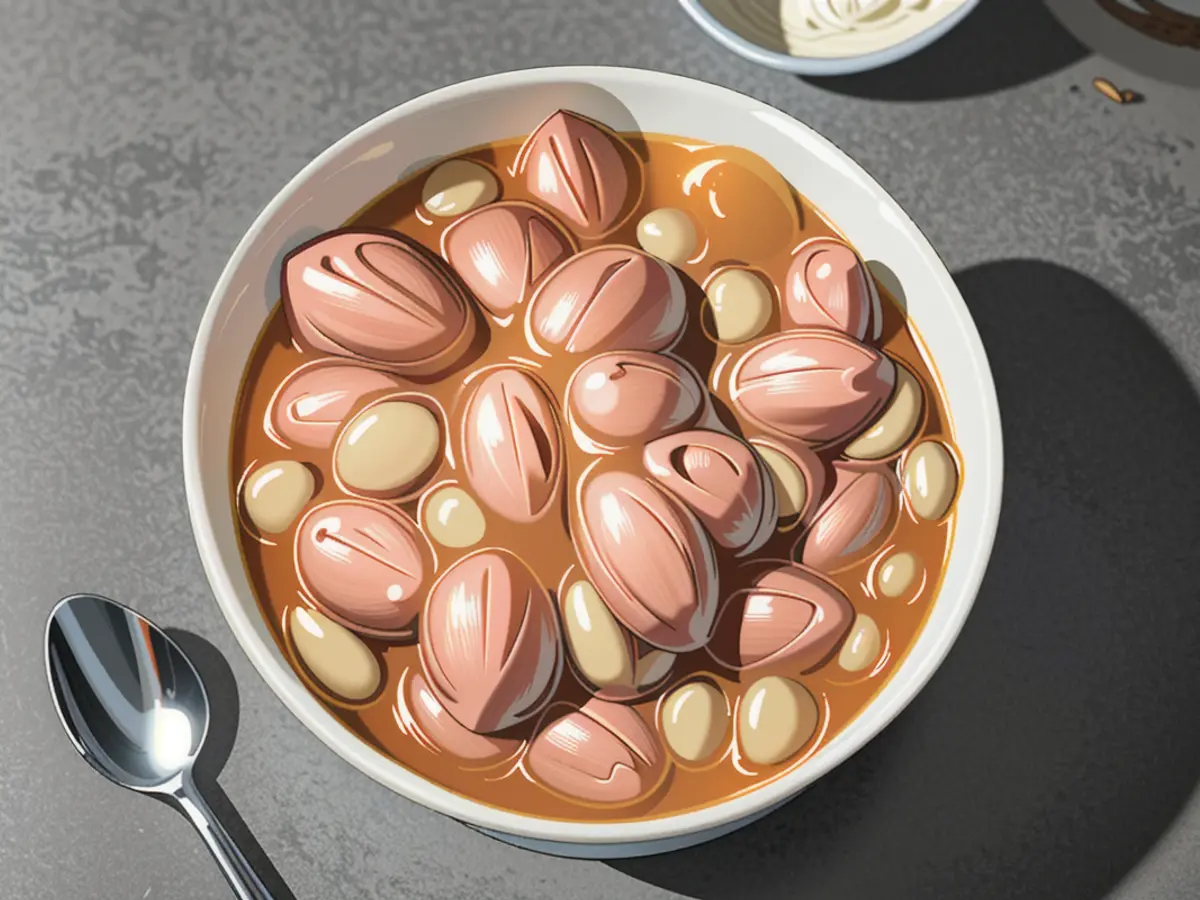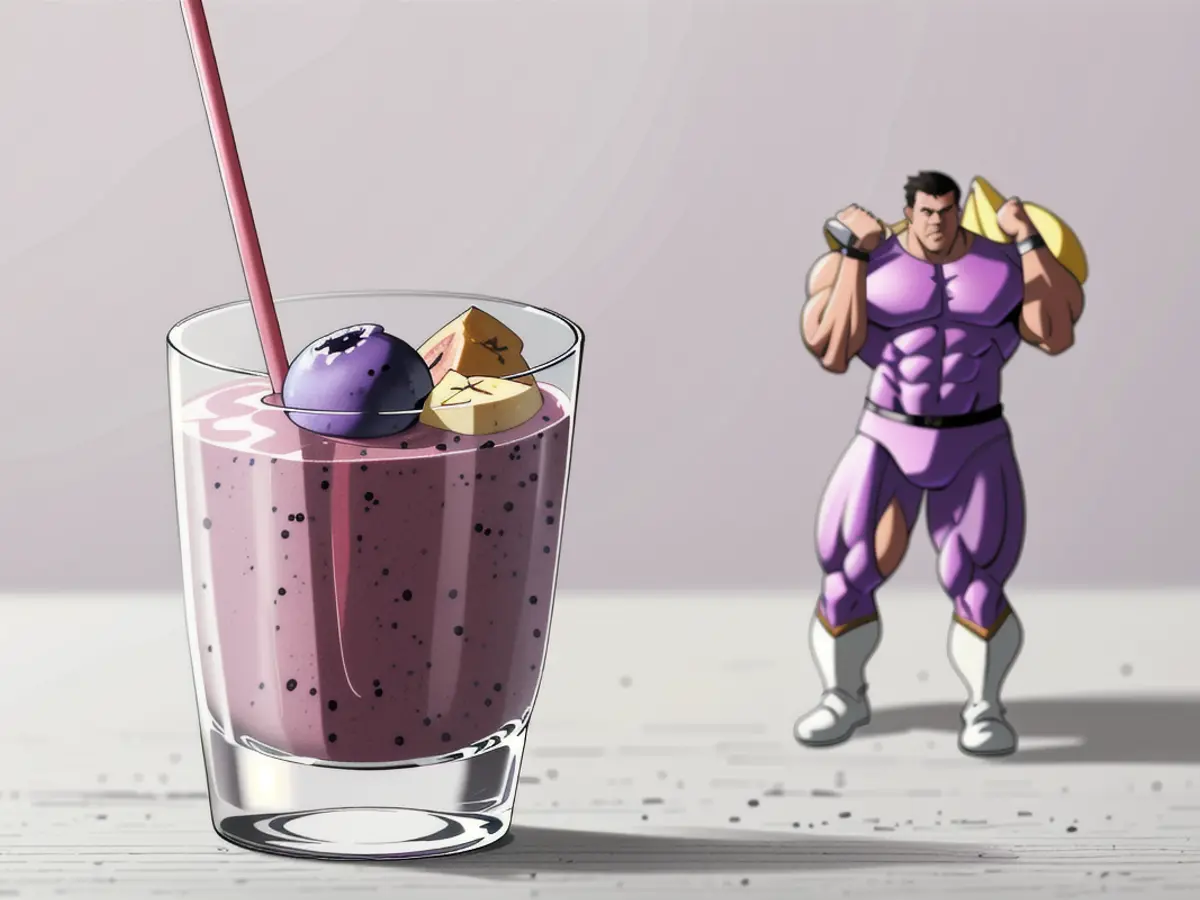Strategies for Enhancing Protein Content in Your Smoothies: Top Picks
Ulevel Up Your Smoothie Game:
Turn your lackluster smoothie routine into a nutritious powerhouse with these wholesome protein replacements! Say goodbye to bland, protein-lacking drinks and welcome a new world of flavor, texture, and benefits. No more powdery messes or spending a fortune on protein powders. Instead, opt for these fantastic options recommended by dietitians:

- Almond Butter: Protein per 2 tablespoons: 7 grams Rich, creamy, and nutritious! Almond butter adds protein, healthy fats, and fiber while complementing various fruits like berries, cherries, and dates.
Beans: Protein per 1 cup: 8.5 grams Break free from traditions and add beans for a nutritional powerhouse. High in protein, fiber, and antioxidants, beans won't overpower your smoothie's flavor.

Soy Milk: Protein per 1 cup: 8.5 grams Pack in a protein punch and elevate your smoothie with unsweetened, organic soy milk. Plus, it's low in saturated fat and contains all essential amino acids.

Hemp Seeds: Protein per 3 tablespoons: 10 grams A top source of plant protein, hemp seeds are your go-to for a nutrient-rich, filling smoothie, featuring a mild, nutty flavor!

Tofu: Protein per 1/5 block: 7 grams Don't limit tofu to savory dishes. This protein-packed option adds texture to any protein smoothie recipe. Plus, it's low in saturated fat, high in iron, and packed with soy isoflavones.

Peanut Butter: Protein per 2 tablespoons: 7.5 grams An upgrade to your banana-blueberry smoothie recipe, peanut butter adds protein, and other healthy nutrients including B vitamins, magnesium, vitamin E, and potassium.

Chia Seeds: Protein per 2 tablespoons: 3.5 grams Boost your protein and fiber levels with a couple of tablespoons of chia seeds. Plus, enjoy the bonus nutrients like omega-3 fatty acids, calcium, iron, magnesium, and zinc!

Kefir: Protein per cup: 8 grams Thirst-quenching and teeming with probiotics, kefir makes a delightful smoothie companion, perfect for those sensitive to lactose.

Greek Yogurt: Protein per 1/2 cup: 12 grams Pack in a protein punch while nourishing your gut with Greek yogurt's creamy texture and probiotics! (Note: Lactobacillus bulgaricus, Streptococcus thermophilus, Lactobacillus acidophilus, Bifidus, Lactobacillus casei are your new gut-friendly friends!)

Why Add Protein to Smoothies?
Reap the benefits of protein while keeping your blood sugar stable and reducing inflammation with protein-packed smoothies. Plus, protein keeps you fuller, aids in healthy weight management, and ensures a well-rounded meal. Opt for wholesome, natural protein sources, and watch your smoothies transform into a nutritious meal you'll look forward to every day!
- Embrace a healthier lifestyle with these smoothie recipes that boost your protein intake, contributing to wellness and fitness-and-exercise.
- Martha Stewart's food cooking guide recommends using Greek yogurt as a protein replacement in smoothie recipes, offering a creamy texture and probiotics.
- With 12 grams of protein per half cup, Greek yogurt is a fantastic option for those seeking a protein-packed, nutritious drink.
- Smoothie recipes incorporating chia seeds offer benefits beyond protein and fiber, providing omega-3 fatty acids, calcium, iron, magnesium, and zinc.
- Tofu's protein-packed nature makes it a versatile ingredient, enhancing protein smoothie recipes with texture and soy isoflavones.
- Hemp seeds, a top source of plant-based protein, add a nutty flavor and fiber to smoothie recipes, contributing to a filling, nutrient-rich meal.
- A immersion in health-and-wellness starts with protein-rich smoothie drinks made from natural sources, like unsweetened, organic soy milk.
- By incorporating beans into smoothie recipes, you can enjoy a nutritious powerhouse high in protein, fiber, and antioxidants.
- Almond butter, once added to your drink recipes, provides healthy fats, fiber, and protein to complement various fruits like berries, cherries, and dates.
- The inclusion of micronutrients found in protein-laden smoothie recipes can help support overall nutrition, ensuring a balanced food-and-drink routine.








